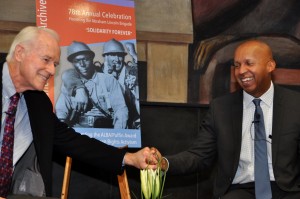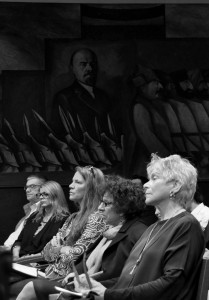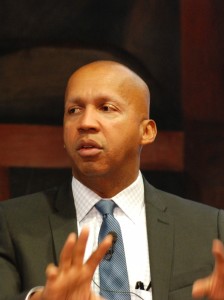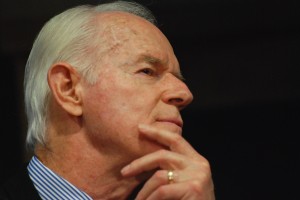Toward truth and reconciliation: Changing the narrative of US history
In a stirring and honest conversation with actor and activist Mike Farrell, ALBA/Puffin Award winner Bryan Stevenson addressed the United States’ continuing struggles with racial injustice, moving his New York audience to tears.
“We are stronger when we have a historical perspective, because it roots our ability to envision a world that is not the world other people think we have to accept,” Bryan Stevenson said in an inspiring, hour-long conversation with actor and activist Mike Farrell during ALBA’s annual reunion at the New School in New York City on April 27. Stevenson is the founder and executive director of the Equal Justice Initiative in Montgomery, Alabama. Later that day, he accepted the fourth annual ALBA/Puffin Award for Human Rights Activism, a $100,000 prize endowed by the Puffin Foundation.
Surrounded by striking images painted in 1930 by Mexican muralist José Clemente Orozco, Farrell and Stevenson discussed the many challenges facing the United States as it confronts its history of discrimination and injustice—a history that lives on in a judicial system that is overwhelmingly skewed against racial minorities and the poor. “In honor of the men and women who gave their time, energy, and in too many instances their lives to defend democracy and human rights,” said Farrell, president of the non-profit organization Death Penalty Focus, “there is no better person than your honoree in today’s America to recognize with the ALBA/Puffin Award. Bryan’s is this country’s most powerful voice for truth and justice. He is one of the leading spokespeople for what is right and good in our country. And his Equal Justice Initiative is leading the way toward a much-needed process of truth and reconciliation.”
 “In the United States we are utterly incapable of reflecting honestly on our history and the things that we do wrong,” Stevenson said. “We confuse pride and support for America with the notion that we can never apologize, never acknowledge our defects. And we are suffering because of it. At the Equal Justice Initiative we are working to change the narrative of race and poverty in this country.
“In the United States we are utterly incapable of reflecting honestly on our history and the things that we do wrong,” Stevenson said. “We confuse pride and support for America with the notion that we can never apologize, never acknowledge our defects. And we are suffering because of it. At the Equal Justice Initiative we are working to change the narrative of race and poverty in this country.
“The way I see it, four institutions have shaped the lives of African Americans. The first is slavery and its legacy. Slavery was sustained by myths: by narratives that tried to dehumanize people of African descent. It is these myths that allowed good people to feel okay about having slaves. Now, unfortunately, there is nothing about those myths in the Emancipation Declaration. As a result, slavery didn’t end: it just evolved during Reconstruction.
“The second institution shaping African American lives goes from Reconstruction until World War II….an era of terrorism. What shaped my grandparents’ worldview was lynching, convict leasing: the daily threat of violence. It was this threat— 4,000 lynchings, 10,000 near-lynchings—that made people submit to racial hierarchy and segregation and that destroyed black families.
“The third institution is the Civil Rights era, which gets a lot of attention, but in a way that is much too superficial and celebratory.
“The fourth contemporary institution is mass incarceration: the fact that one in three black male babies born in the United States today is expected to go to jail or prison. That was never true in the 20th-century or in the 19th. The presumption of guilt that we assign to people of color, black or brown, is a legacy of our failure to tell the truth about our racial history. It is a result of the fact that we never had a truth and reconciliation process like they had in South Africa or in Rwanda. I firmly believe that until we tell the truth about this history, we will not recover, we will not move forward. The basic human-rights violations are too grave and too overwhelming to just evaporate. They create traces and shadows and cuts and injuries that we cannot ignore. If we do, they will fester.”
 Stevenson, whom Farrell called “one of America’s leading orators,” held his audience captive, sometimes moving it to tears, by alternating stark truths with poignant stories from his own upbringing in a racially divided Alabama and his long experience as a trial lawyer working on behalf of indigent defendants, particularly on death row. “The U.S. prison population has grown from 300,000 in 1972 to 2.3 million today,” he said. “Nearly 3,000 children have been condemned to die in prison; for every nine people executed, one innocent person has been exonerated. We would be very uncomfortable with a law that would have someone who is convicted of rape be raped by an employee of the state. We think that is inhumane. Nor would we hire someone to beat people convicted of assault. We’d feel bad for the person who would have to do the raping or the beating. But we absolutely believe we have to kill people who have killed people. We have these constructs—lethal injection or executions by midnight—that allow us to think that this practice will not reflect on us, that we are not killing other people, many of whom are innocent. But it is in our name that these people are executed. And that is no better or different than letting people be raped or beaten in our names—or using drones to assassinate them.”
Stevenson, whom Farrell called “one of America’s leading orators,” held his audience captive, sometimes moving it to tears, by alternating stark truths with poignant stories from his own upbringing in a racially divided Alabama and his long experience as a trial lawyer working on behalf of indigent defendants, particularly on death row. “The U.S. prison population has grown from 300,000 in 1972 to 2.3 million today,” he said. “Nearly 3,000 children have been condemned to die in prison; for every nine people executed, one innocent person has been exonerated. We would be very uncomfortable with a law that would have someone who is convicted of rape be raped by an employee of the state. We think that is inhumane. Nor would we hire someone to beat people convicted of assault. We’d feel bad for the person who would have to do the raping or the beating. But we absolutely believe we have to kill people who have killed people. We have these constructs—lethal injection or executions by midnight—that allow us to think that this practice will not reflect on us, that we are not killing other people, many of whom are innocent. But it is in our name that these people are executed. And that is no better or different than letting people be raped or beaten in our names—or using drones to assassinate them.”
Farrell, best known for his work on the popular television series M*A*S*H, is a long-time human-rights activist. Since 1979 he has been spokesperson for CONCERN/America, an international refugee aid and development organization, visiting refugee camps in Asia and Central America and helping to disseminate information about CONCERN/America’s work across the globe. He served as Co-Chair of the California Committee of Human Rights Watch from 1994 to 2004 and remains a member of the Committee. He presently serves with Death Penalty Focus and as a member of the advisory board of the National Coalition to Abolish the Death Penalty.
ALBA’s 78th annual reunion was made possible with the support of an Honorary Committee including Julian Bond, Peter Coyote, Lila Downs, Gael García Bernal, Oliver Stone, and the members of the Host Committee including Burt Cohen, Dan Czitrom, Kevin Dyer, Sebastiaan Faber, Jeanne Houck, Gabriel Jackson, Julia Newman, Ellyn Polshek, Michael Ratner, and Fredda Weiss. The entire conversation between Stevenson and Farrell is available as a 55-minute podcast here, and can be seen on video here.
Bryan Stevenson and Mike Farrell from Sebastiaan Faber on Vimeo.














